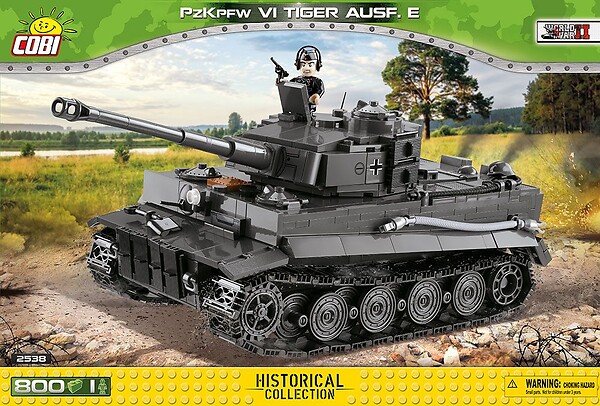A Polish toy company has withdrawn models replicating figures and vehicles from Nazi Germany after they aroused criticism and concern in the United States.
The models, produced by Warsaw-based Cobi, were condemned by leading American toy manufacturers, who said they presented “offensive” symbols which “encourage hatred and extreme violence”. Cobi initially defended the toys, claiming that they had educational value, before later backtracking.
One of the items in question (pictured above) is a scale model of a 1939 Mercedes G4, featuring flags with the Iron Cross on a red, white and black background – a symbol associated with Nazi Germany. One product listing “noted Adolf Hitler’s affection for the vehicle”, according to Toybook, a trade magazine.
The vehicle also comes with a figurine of Friedrich Wilhelm Ernst Paulus, a Wehrmacht field marshal who served during World War Two, including in the invasion of Poland. In a video on the company’s YouTube account last month, the model is described as a “really beautiful” toy that Cobi collectors would be “very happy” to own.
The planned release of that set, which was supposed to take place on 1 March, prompted a backlash. A number of leading US toy producers and retailers, including MGA Entertainment, Nikko Toys and Mighty Mojo Toys, condemned the models.
The vice president of Mighty Mojo Toys, Ariel Moghaddam, accused Cobi of “producing and exposing antisemitic propaganda”, in a statement quoted by Toybook.
Initially, Cobi responded by telling Toybook that they “aimed to represent history in the most accurate way possible, and that means bringing attention to historical figures of all kinds, both the positive and negative”.
“Our sincere belief is that by highlighting certain aspects of history, we are in no way trivialising the past, but instead bringing a laser focus on specific events and people so as to create a more informed society,” they added.
The inclusion of Paulus was “intended to serve as a cautionary tale of the overreach of power, not an endorsement of the person in any way”. Cobi noted that some of its previous sets have featured figures including Oskar Schindler and Charles de Gaulle.
However, eventually the firm relented, and announced that it was pulling the sets from sale. “We realised some had taken offence and now fully understand the implications,” said Cobi’s owner, Robert Podleś.
WTF pic.twitter.com/M3OhIbnUnp
— Christian Davies (@crsdavies) October 2, 2019
Podleś recalled that his own grandfathers were imprisoned by Soviet and German forces. His firm had intended for the toys to be “educational”, but he admitted that this goal had not been clearly explained in advertisements for the recent products. “For that, I apologise.”
There have been “errors in staffing and training that we are fixing immediately. I am ashamed that it has taken us this long to address this problem”, he added. “I also believe in fighting antisemitism in all forms.”
Despite the withdrawal of some of the company’s models from the Nazi era – such as a 1938 Merdeces 770 featuring military intelligence chief Wilhelm Franz Canaris – others still remain available. Cobi’s website still lists various models of Panzer tanks, which it describes as “great for young history enthusiasts”.

Cobi – which produces bricks that are compatible with Lego – has become well know for its models relating to historical events, including many themed around World War Two. Several of the items are advertised for children aged 6+.
The company has previously faced criticism for its Nazi-related models. In 2014, a Swedish department store decided to stop stocking the toys, saying it was something they did not want to “promote as a form of ideal”. Four years later, a shop in Berlin withdrew Cobi’s Nazi-era tanks from sale.
Following the controversy in Sweden, Podleś argued that the toys were a way that “we can teach history through good fun”.
Cobi was created in 1987, initially selling puzzles and board games. After moving into model figurines and block kits, the company fell into a legal dispute with Lego, though that case was later thrown out of court.
Images: Cobi promotional materials

Juliette Bretan is a freelance journalist covering Polish and Eastern European current affairs and culture. Her work has featured on the BBC World Service, and in CityMetric, The Independent, Ozy, New Eastern Europe and Culture.pl.




















